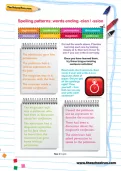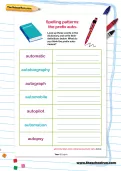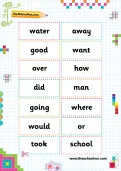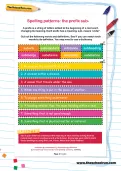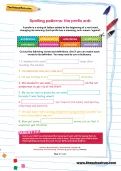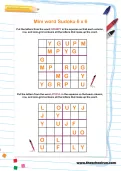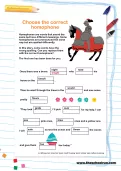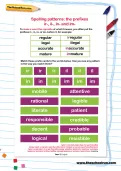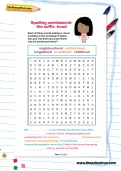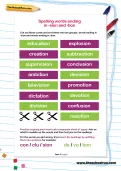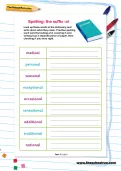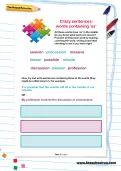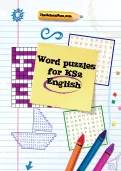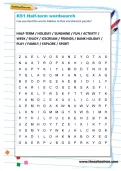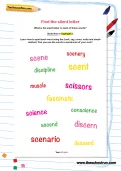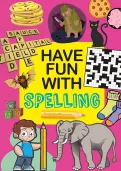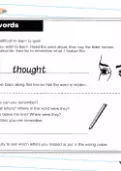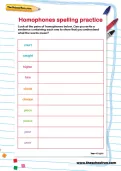A prefix is a string of letters added to the beginning of a root word, changing its meaning. Each prefix has a meaning; sub- means ‘under’. Cut out the following words and definitions. See if you can match each words to its definition.
or
Register to add to your saved resources
Already a subscriber? to view this content.
A prefix is a string of letters added to the beginning of a root word, changing its meaning. Each prefix has a meaning; anti- means ‘against’. Cut out the following words and definitions. See if you can match each words to its definition.
or
Register to add to your saved resources
Already a subscriber? to view this content.
Put the letters from the word GRUMPY in the squares so that each column, row, and mini-grid contains all the letters that make up the word.
or
Register to add to your saved resources
Can you rearrange these letters to find the word solution to each clue?
or
Register to add to your saved resources
Already a subscriber? to view this content.
Homophones are words that sound the same but have different meanings. Some homophones are pronounced the same way but are spelled differently. In this story, some words have the
wrong spelling. Can you replace them with the correct homophone?
or
Register to add to your saved resources
Already a subscriber? to view this content.
To make a word the opposite of what it means, you often put the prefixes ir-, il-, in- or im- before it. Match these prefix cards to the words below. Can you see any pattern in the way you match them?
or
Register to add to your saved resources
Already a subscriber? to view this content.
Look up these words in the dictionary and write their definitions below. What do you think the prefix auto means?
or
Register to add to your saved resources
Each of these words ending in -hood is hidden in the wordsearch. Can you find them and insert them into the sentences below?
or
Register to add to your saved resources
Already a subscriber? to view this content.
Syllables in a word are like beats. All these words have three syllables. Clap out the syllables as you say each word then practise spelling it with the look, cover, write and check method.
or
Register to add to your saved resources
Already a subscriber? to view this content.
Cut out these cards and sort them into two groups: words ending in -sion and words ending in -tion. Practise copying each word onto a separate sheet of paper. Ask an adult to muddle up the words and then test you on the spellings.
or
Register to add to your saved resources
Already a subscriber? to view this content.
Look up these words in the dictionary and write down what they mean. Practise spelling each word by looking at it, covering it over, writing it on a separate piece of paper, then checking if you were right.
or
Register to add to your saved resources
Already a subscriber? to view this content.
Each of these words ending in -ment is hidden in the wordsearch below. Can you find them and insert them into the sentences below?
or
Register to add to your saved resources
Already a subscriber? to view this content.
All these words have ‘ss’ in the middle. Do you know what each one means? Practise writing each word by looking, covering the word, writing it and then checking to see if you were right.
or
Register to add to your saved resources
Already a subscriber? to view this content.
Are you and your child tired of the same old English revision and practice sessions? Try something completely new and give them these fun English word puzzles instead! They'll review everything from connectives to apostrophes, using what they learn in class to solve codes, crosswords and wordsearches.
or
Register to add to your saved resources
Already a subscriber? to view this content.
Clap out the syllables in these words, and rewrite them with the syllables divided out.
or
Register to add to your saved resources
Already a subscriber? to view this content.
Use this wordsearch during half-term to help your child with vocabulary and spelling while recognising words that are all about having fun!
or
Register to add to your saved resources
Spelling words with silent letters can be tricky, but help your child remember to watch for them with this practice worksheet.
or
Register to add to your saved resources
Already a subscriber? to view this content.
Does your child’s spelling really let their writing down? Have fun with spelling offers you practical and effective strategies to help support your child’s learning at home, based on a real understanding of how spelling is taught and why it’s tricky to master. The bad news? Your child will be beating you at Scrabble before you know it!
or
Register to add to your saved resources
Already a subscriber? to view this content.
This worksheet gives suggestions on how to memorise the spelling of the word 'thought'. The strategies here could be applied to other tricky words.
or
Register to add to your saved resources
Already a subscriber? to view this content.
Pairs of homophones and then blank boxes for your child to write their own sentences containing each homophone, demonstrating that they understand the meaning of each.
or
Register to add to your saved resources
Already a subscriber? to view this content.
